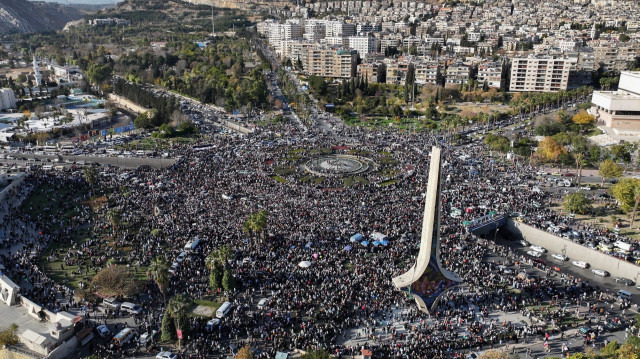
Crowds wave new flags, chant revolutionary songs in city square
Thousands of Syrians gathered in the west-central city of Hama to celebrate the end of the Baath Party's 61-year rule.
The event featured chants, revolutionary songs, and the waving of the three-star Syrian flag, a symbol of opposition unity.
The gathering, which began in the evening, saw participants of all ages joining in to sing revolutionary anthems.
A stage set up in the city square played the popular song “My Paradise Homeland,” which drew enthusiastic participation from the crowd.
Lujain Bassam al-Jammal, whose family suffered personal losses during the 1982 Hama massacre, attended with a photo of her uncle, Omar Mohammed Tahir Dagestani, who was among the victims. Speaking to Anadolu, she said: “We've waited years for this moment. Thank God, the tyrant is gone. There's no more oppression over us,” referring to Assad.
“We will rebuild Syria together, with no sectarianism. Sunni, Alawite, Druze, Christian – we are all Syrians,” Jammal added.
Abdollah Taba, another attendee, shared his memories of living under Assad's regime.
“We lived under siege and constant fear. When I heard on December 8 that Bashar had fled, I couldn't believe it. But once confirmed, the joy was indescribable. This is a victory for all of Syria,” he told Anadolu.
Taba, who was once detained by pro-Assad militias and later fled to Egypt in 2012, expressed optimism for the country's future: “Without the oppressive Assad regime, we no longer live in fear. United, we will rebuild.”
Other participants shared their thoughts as well. A 20-year-old, who chose to remain anonymous, expressed his excitement about resuming his interrupted education.
An elderly woman reflected on her late husband, who had written extensively about the Hama massacre: “I wish he had lived to see this day,” she said.
- 1982 Hama massacre: a tragic legacy
The 1982 Hama massacre, orchestrated by Rifaat al-Assad on orders from then-President Hafez al-Assad, remains one of the darkest chapters in Syria's history.
To suppress an uprising by the Muslim Brotherhood, regime forces besieged the city, unleashing aerial bombardments, artillery strikes, and mass executions over 27 days.
The Syrian Network for Human Rights (SNHR) estimates that at least 30,000 civilians lost their lives, with 17,000 more disappearing and presumed executed.
Large portions of the city were reduced to rubble, including 88 mosques, three churches, and numerous historic sites.
The memories of this tragedy remain deeply etched in the hearts of Hama's residents, who now look to the future with renewed hope for a Syria free from tyranny.
The fall of Assad's regime has reignited their aspirations for unity and prosperity.

